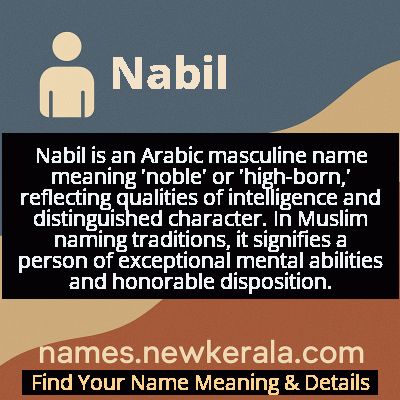Nabil Name Meaning & Details
Origin, Popularity, Numerology Analysis & Name Meaning of Nabil
Discover the origin, meaning, and cultural significance of the name NABIL. Delve into its historical roots and explore the lasting impact it has had on communities and traditions.
Name
Nabil
Gender
Male
Origin
Muslim
Lucky Number
2
Meaning of the Name - Nabil
Nabil is an Arabic masculine name meaning 'noble' or 'high-born,' reflecting qualities of intelligence and distinguished character. In Muslim naming traditions, it signifies a person of exceptional mental abilities and honorable disposition.
Nabil - Complete Numerology Analysis
Your Numerology Number
Based on Pythagorean Numerology System
Ruling Planet
Moon
Positive Nature
Diplomatic, friendly, artistic, empathetic.
Negative Traits
Over-sensitive, moody, indecisive, prone to self-pity.
Lucky Colours
Green, cream, white.
Lucky Days
Monday.
Lucky Stones
Pearl, moonstone.
Harmony Numbers
1, 3, 4.
Best Suited Professions
Diplomats, mediators, caregivers, artists.
What People Like About You
Cooperative spirit, friendliness, artistic talent.
Famous People Named Nabil
Nabil Elaraby
Diplomat and Jurist
Former Secretary-General of the Arab League and Judge at the International Court of Justice
Nabil Fekir
Professional Footballer
French international midfielder known for his technical skills and creative playmaking
Nabil Shaban
Actor and Disability Rights Activist
Pioneering disability representation in media and co-founder of Graeae Theatre Company
Nabil Ayouch
Film Director
Award-winning Moroccan-French filmmaker addressing social issues in Arab society
Name Variations & International Equivalents
Click on blue names to explore their detailed meanings. Gray names with will be available soon.
Cultural & Historical Significance
Extended Personality Analysis
People named Nabil are commonly associated with exceptional intellectual capabilities and analytical thinking. They typically demonstrate quick comprehension, logical reasoning, and the ability to grasp complex concepts with ease. This intellectual prowess is often accompanied by strong communication skills, enabling them to articulate sophisticated ideas clearly and persuasively. Beyond cognitive abilities, Nabils are frequently characterized by their noble demeanor, displaying integrity, honor, and a strong moral compass in their interactions. They tend to be natural problem-solvers who approach challenges with strategic thinking and careful consideration. Many exhibit leadership qualities rooted in wisdom rather than authority, earning respect through their knowledge and ethical conduct. Their personality often combines curiosity with practicality, making them effective in both academic and real-world applications of their intelligence. The combination of mental sharpness and principled character creates individuals who are not only smart but also trustworthy and socially conscious.
Modern Usage & Popularity
In contemporary naming practices, Nabil continues to enjoy widespread popularity across Muslim communities globally while also gaining recognition in multicultural societies. The name maintains strong traditional appeal while adapting well to modern contexts, making it a versatile choice for parents balancing cultural heritage with contemporary sensibilities. Recent decades have seen consistent usage in Arab countries, with particular strength in North Africa and the Middle East. Among diaspora communities in Europe and North America, Nabil serves as a bridge between cultural identity and integration, with its accessible pronunciation facilitating cross-cultural acceptance. Social media and global connectivity have helped sustain the name's visibility, while its positive associations with intelligence and nobility continue to resonate with new generations of parents. The name's timeless quality and meaningful significance ensure its ongoing relevance in an increasingly globalized world.
Symbolic & Spiritual Meanings
Symbolically, Nabil represents the ideal fusion of intellectual excellence and moral nobility. The name embodies the concept that true intelligence encompasses not just cognitive ability but also ethical understanding and social responsibility. It symbolizes the enlightened individual who uses knowledge for constructive purposes and approaches life with wisdom and integrity. Metaphorically, Nabil suggests a person who elevates their surroundings through thoughtful contribution and principled conduct. The name carries connotations of leadership through insight rather than force, representing the power of informed judgment and careful consideration. In many cultural interpretations, it symbolizes the aspirational qualities of the cultivated mind - one that respects tradition while embracing progress, values learning while practicing compassion, and achieves success while maintaining humility. This rich symbolic meaning makes Nabil more than just a name; it represents a holistic ideal of human excellence.

